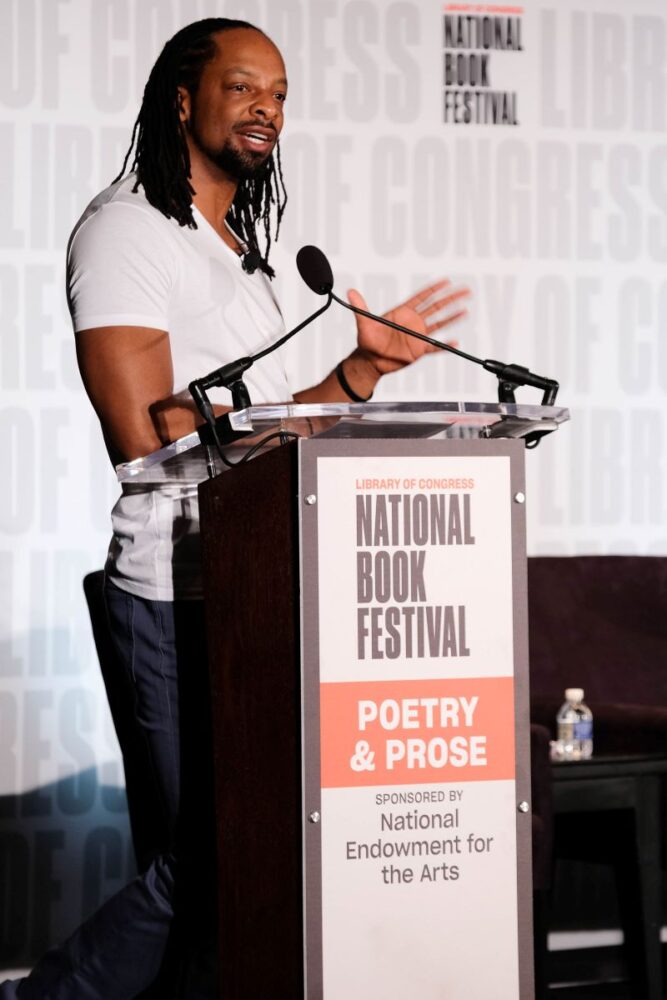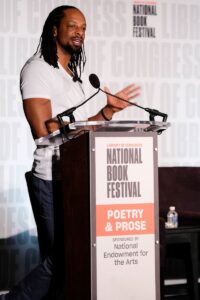Jericho Brown
A Pulitzer Prize–winning poet, Jericho Brown’s poems explore the complexities of sexuality, Black masculinity, family, religion, and place.

Library of Congress
Jericho Brown. Photo by Kimberly T. Powell.
Jericho Brown is a Pulitzer Prize–winning poet whose volumes of poetry include Please (2008), The New Testament (2014), and The Tradition (2019). Brown’s poems often explore the complexities of sexuality, Black masculinity, family, religion, and place.
Jericho Brown, born Nelson Demery III on April 14, 1976, in Shreveport, credits his upbringing at Mt. Canaan Missionary Baptist Church with preparing him for life as a poet. The pageantry of the services, the meticulous study of scriptures, and the traditional recitation of poems shaped his identity and his ear as a poet. His early works put his attraction to men in tension with his tumultuous relationship with his father and his religious upbringing.
New Orleans Influence
“I always tell people I was born and raised in Shreveport but grew up in New Orleans.” –– Jericho Brown
Brown left Shreveport to attend Dillard University, where he was taught and mentored by English professor Mona Lisa Saloy before graduating magna cum laude. (Saloy would eventually serve as Louisiana’s 2022–2023 poet laureate.) Brown, who worked as a speechwriter for former New Orleans Mayor Marc Morial, credits the fast-paced environment at New Orleans City Hall as conditioning him to meet writing deadlines. However, his participation in the rigorous NOMMO Literary Workshop led by New Orleans writer, editor, and activist Kalamu ya Salaam catalyzed Brown to think more deeply about his work. Participation in that writing community included weekly writing workshops and monthly public readings, and the workshop drew other local writers and visiting writers from across the country.
Brown later earned a graduate degree in creative writing from the University of New Orleans, where his faculty mentors included Kay Murphy and Niyi Osundare. He earned his PhD in literature from the University of Houston. Educated in universities in the South, Brown now serves as director of the Creative Writing Program at Emory University in Atlanta, Georgia.
In his Pulitzer Prize–winning book The Tradition, Brown created a new poetic form called the “duplex.” The duplex is a contemporary poetic form that consists of seven couplets with nine to eleven syllables per line; the second line of the preceding stanza echoes the first line of the following stanza, and the last line echoes the first. It is intended to be a mix of the sonnet, ghazal, and blues forms. When asked what inspired the creation of the duplex, Brown told Bennington Review editor Michael Dumanis: “If I can take a sonnet and I can take a ghazal and I can take the blues—we’re not gonna get around taking the blues, since I’m Black—if I take those three things, is it possible for me to merge them into a single coherent form?”
The answer was yes. Brown’s poetic form has gained literary attention and has inspired poets to write duplexes of their own.
Among other places, Brown’s poetry has appeared in the Paris Review, New York Times, and New Yorker. His awards include a Guggenheim Fellowship, Anisfield-Wolf Book Award, National Endowment for the Arts Fellowship in Poetry, American Book Award, Whiting Award, and Pulitzer Prize. In October 2020 he was awarded the William Corrington Award for Literary Excellence from Centenary College in his hometown of Shreveport. In 2023 he was featured in the PBS TV series Southern Storytellers.
